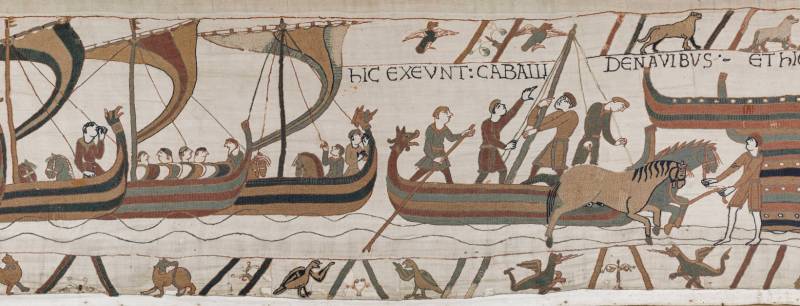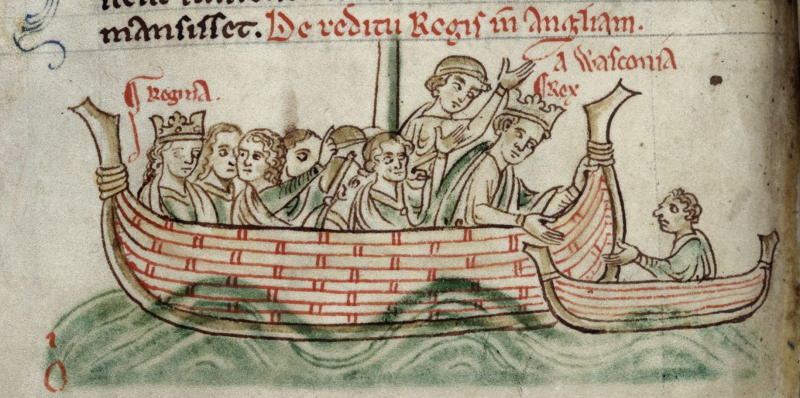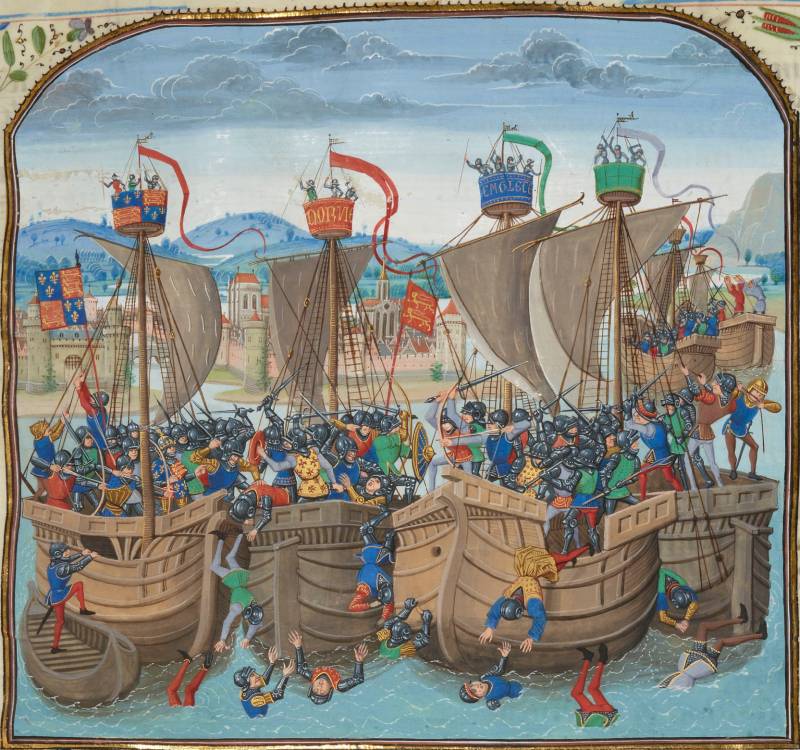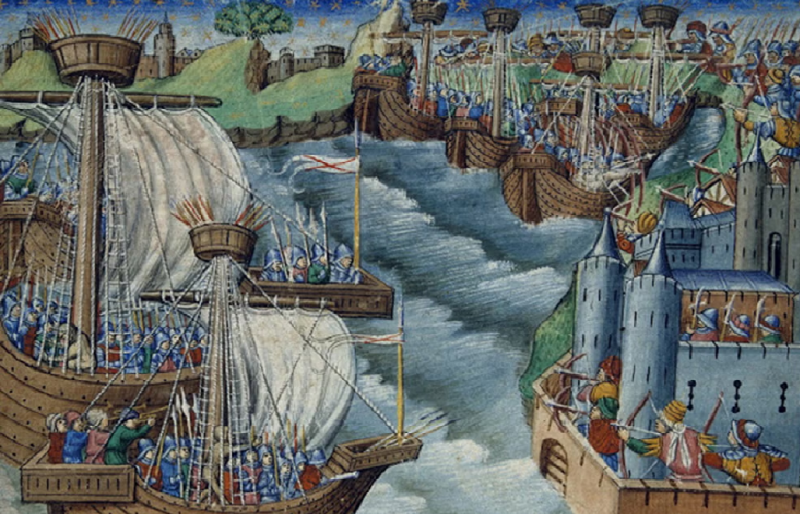The youth of the English fleet

Arrival of William the Conqueror in England.
From William the Conqueror to the Hundred Years' War
At first everything was simple.
William I the Conqueror in 1066 issued a bill according to which the five main ports of the kingdom bore monetary and other duties for the creation fleet. According to William, the Five Ports (Dover, Hastings, Hythe, New Romney and Sandwich) were to put 57 ships to sea if necessary in exchange for privileges and tax reductions. It is clear that they are fully equipped and with teams, but for two months. Further, the king, if he continued to use the fleet, was forced to pay "at a good trading rate".
But it soon quickly became clear that the very existence of the Cinque Ports and the agreement described above was hindering the development of the fleet. That is, roughly speaking, its size is limited to 57 vessels. What if you need more?
And the same William the Conqueror came up with one more thing - arrest and forced recruitment into the service of the king. All ships in English ports, if suddenly the need arises. It is clear that when a general arrest was ordered, foreign ships were forced into service on the same basis as English ships, and this practice continued until the early years of the reign of Elizabeth I.
Well, the first royal ships arose under the famous Prince John - the same John the Landless, familiar to our readers from Sir Walter Scott's novel “Ivanhoe”. It was Prince John who introduced the positions "Keeper of the king's ships" и "Keeper and Governor".
John did not do this out of a good life - Richard the Lionheart, having left for Palestine, remained king, that is, only he could arm and collect taxes for the fleet of the Five Ports, and John had a conflict with the barons. Therefore, he became concerned with the creation of the royal fleet itself. True, this did not go in vain - when John became a full-fledged king, the barons rebelled, soon a French invading army landed in England, and John was forced to sign the Magna Carta.
Until the reign of Henry III, the fleet consisted mainly of sailing ships, and by this time many had two masts, each carrying one sail. The transformation of a merchant ship into a warship was carried out by equipping it with temporary bow and stern castles (forecastle and aftercastle), which later became a permanent forecastle and poop, adding "upper castle" or combat Mars and providing adequate weapons.
Undoubtedly, the king's own ships were more durable and internally better equipped for battle than the mercenary merchant ships.

Return of Henry III and Eleanor of Aquitaine from Gascony in 1243.
It is from the time of John the Landless that we can talk about at least some kind of royal fleet. In the XNUMXth and XNUMXth centuries, the "keeper of the royal ships" first became clerk of marine causes then clerk of the navy and finally in the XNUMXth century - clerk of the acts. This was the first naval post in England. But others soon emerged.
Around 1299–1300 Another position has arisen - keeper (or governor) of the sea (keepers or governors of the sea). There were two of them - Guardian of the East or Narrow seas и Guardian of the South (this nobleman or knight was responsible for all the fighting in the Channel). The most interesting thing is that the fleet was supplied and paid from funds Wardrobe Accounts.
Around this time Edward I created and Navy Board, which included all the Guardians, the constable, the treasurer and the king himself. And at the beginning of the Hundred Years' War, the English fleet earned much praise.
During the Hundred Years' War
However, already in the 1360s and 1370s, the British began to have problems. For example, the year of Edward III's death was characterized by the sack of Rye, Lewes, Hastings, Yarmouth, Dartmouth, Plymouth, Folkestone, Portsmouth and the Isle of Wight by Spanish-French squadrons. In 1378, the House of Commons came into direct conflict with the royal authorities, citing losses and poverty caused by non-payment or delay of payment for the use of ships, as well as the lack of compensation for the procurement of supplies and zips, as the reasons for the weakness of the English fleet. And in 1380 the king agreed that all owners of ships hired for the royal service would receive compensation of 3 shillings 4 pence per ton every three months, starting from the day of hire.
Since such an amount turned out to be unaffordable for the kings, they first tried to reduce it to 2 shillings, then to one and a half, and problems with the fleet grew. At the same time, the merchant fleet was also shrinking, which forced King Henry IV to adopt a decree obliging English subjects to export and import goods only on English ships, and the majority of the crews of these ships had to be subjects of the English crown. In fact, this was England's first attempt to pass an equivalent to the Navigation Acts.

Battle of Sluys, 1340.
This measure entailed an increase in English merchant shipping and a gradual decrease in dependence on the Hansa and its transportation, which in 1406 accounted for up to 70% of the total number of goods supplied and exported. During the time of Henry V, English ships were already sailing to Lisbon and Morocco, and English fishermen were fishing throughout the North Sea all the way to Iceland.
Under Henry V, the Royal Navy also rose from oblivion. So, in 1416, Henry V's fleet consisted of 17 coggs (the largest is the 1-ton Jesus of the Tower), 000 carracks, 7 barques and 2 balinger (balinger - a small fishing vessel, mainly for hunting whales). At the same time, Henry V began construction of the giant Grace Dieu, a ship 12 feet (218 meters) long and 66,5 feet (50 meters) wide.
The armament consisted of only three cannons, but the forecastle and aftercastle were raised to a height of up to 50 feet for the purpose of shooting down enemy ships with archers and slingers. The total displacement is estimated at 2 tons.
The ship never went to sea and sank in 1439 from a lightning strike in the River Hamble.
The construction of such a large fleet could not but affect the king's finances, Henry fell into large debts, and after his death in 1422 his property, including the royal ships, was largely sold off at residual value. At the same time, Henry V's creditors received only 1 marks; the rest of the money from the sale was simply pocketed by the new king Henry VI.

Grace Dieu, reconstruction.
This sale of the fleet provoked England's weakness at sea, and pirates began to plunder the English shores. In addition, the War of the Roses soon began, and the entire pirate freemen were very often led by English barons.
During the War of the Roses
In 1432, the House of Commons officially declared that Danish ships had plundered the harbor of Hull (Gul) to the amount of £5, and other ports to the amount of £000 in one year, and demanded that letters of marque be issued to compensate for the losses.
In 1435, William Morphout of Winchelsea applied for pardon after serving, as he sarcastically put it, "a long time at Dover Castle", he put to sea with 100 men to attack the king's enemies. It was difficult for him to get provisions, which, apparently, led him to the path of piracy, but instead of Danish ones, he began to rob his own, and English ships.
“You use your shipping to fight the poor merchants, rob and rob them of their goods, and you yourself become robbers and pirates.”,
– this is how a contemporary described this situation.
The statute of Henry V qualified the violation of the truce and safe conduct as high treason, and in order to somehow legalize privateering, the position of Guardian of the patent, who had to be a high-ranking person with an income of at least £40 per year. The Keeper was also the guarantor for the privateer, and if the captain took the slippery slope of piracy, the Keeper paid the privateer's losses.
Under Henry VI, neutrals were provided with free letters of safe conduct for loading goods onto ships, and the House of Commons protested this decision - because, according to parliamentarians, protection had to be paid for. True, by that time the navy had been sold for debts, and the safe conduct was only some kind of paper wish to the pirates not to rob this ship. It is clear that pirates were much more afraid of warships, and not of some pieces of paper.
Instead of building a royal fleet, Henry VI resorted to hiring ships for service. However, this turned out to be much more expensive - for example, in 1450, a mercenary fleet cost £13, that is, a quarter of the entire annual income of the crown, and the Treasury declared that it was not able to cover this debt. As a result, the king paid only 000 pounds in money, and gave the rest in goods, wool, some assets and... the right to collect taxes on certain lands.

Henry V's fleet
Realizing that this situation was abnormal, from 1455 Henry began to rent out his few ships to merchants. Yes, this brought some profit to the crown (for example, the already mentioned Jesus of the Tower brought the crown 4 pounds 16 shillings and 4 pence, but he died on the same voyage, so the profit did not cover the losses).
In the same 1455, the War of the Roses began, and the fleet was abandoned for a long time.
In 1461, Edward IV introduced the measurement of ships' tonnage in barrels of Bordeaux wine. One barrel (do) with a volume of 252 gallons and became a measure of cargo capacity, and later of displacement, which at that time was determined simply by how many such barrels a ship could take on board. The word later came from the name of this barrel "ton".
Edward IV decided to restore the navy and acted very methodically. In 1464, the Navigation Act came into force, the first to be approved by the Crown since the reign of Richard II, and although it expired after three years, it became the promise of future and more effective legislation. Edward is said to have been a trader himself, and trade treaties with Burgundy, Brittany and Castile show that he understood where the sources of national wealth lay.
Nevertheless, only Richard III began to buy (rather than build) royal ships, during whose short reign 8 ships were acquired, mainly in France and Spain. However, in 1485, at the Battle of Bosworth, Richard was defeated, and Henry VII Tudor ascended the throne, and he laid the foundations that later made it possible to begin the construction of the prototype of a regular fleet.
Henry VII and the fleet
It was under Henry VII that the earnings of sailors and soldiers on ships were set at a shilling a week when in harbor, and a shilling and three pence a week at sea. Additionally, food was supplied, for which a shilling and a halfpenny per week were allocated. Sailors, shipyard workers, lumberjacks and all others received not only wages, but also rations. For the first time, blue jackets were purchased for one hundred people on flagship ships - the forerunner of the future uniform.
The captain, the highest officer in the fleet, received three shillings and four pence a week. Treasurer and boatswain - one shilling and eight pence, quartermaster - one shilling and six pence, steward and cook - one shilling and three pence. These were port rates; perhaps they were higher at sea.

John Cabot at an audience with Henry VII before setting sail in search of new lands.
For example, when the Sovereign sailed from the Thames Estuary to Portsmouth, the voyage took 31 days. The captain received 2 pounds 10 shillings for this voyage, the purser - 14 shillings and 8 pence, the quartermasters - 10 shillings each, the boatswain - 16 shillings and 8 pence, the steward - 8 shillings, the cook - 10 shillings.
However, the British were not yet a maritime nation. As the Spanish ambassador to England, Don Ferdinando de Puebla, wrote: “English sailors are complete ignoramuses and savages”.
The discovery of the New World had a great influence on Henry, and the English king also decided to join the search for new lands. But this required the construction of a fleet. And Henry began with the construction of royal shipyards; it was under him that shipyards were built in Deptford, Portsmouth and Woolwich.
The king became concerned with the construction of dry docks and the creation of logistics for the delivery of materials to the shipyard, which King Henry VIII later took advantage of during the construction of the first Tudor fleet.
The main thing that Henry VII did was to create a material base. He left behind seven royal ships - two carracks "Sovereign" and "Regent", two small 80-ton ships that were registered as galleys (Galley), the ship "Michael", captured from the Scots in 1488, the caravels "Mary and John" and "Carvel Ewe".
This was precisely the starting position of Henry VIII, who began an extensive program of building a large fleet.
References:
1. Monson, William “The naval tracts of Sir William Monson” – London, Printed for the Navy Records Society, 1902.
2. HR Fox “English Seamen under the Tudors” – London, 1868.
3. William Laird Clowes, Clements Robert, Sir Markham “The Royal Navy: A History from the Earliest Times to the Present” – Chatham Publishing; Reissue edition, 1997.
4. Michael Oppenheim “A History of the Administration of the Royal Navy and of Merchant Shipping in Relation to the Navy” - London, J. Lane, 1896.
Information